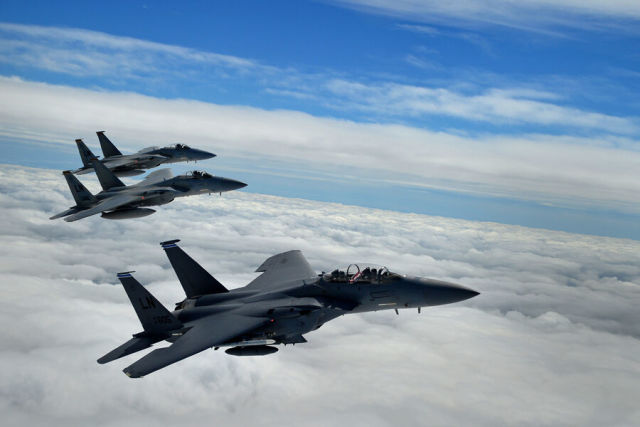WP: The US sent the Air Force towards Iran after reports of preparations for an attack on Saudi Arabia Despite disagreements over Saudi Arabia's decision to cut oil production, the United States intends to protect the kingdom from Iranian aggression.
After reports that Tehran was preparing an attack on targets in Saudi Arabia, the Americans sent warplanes in its direction.
Planes for protection
Despite the "fury" of the United States over Saudi Arabia's decision to cut oil production in the face of a global shortage and the threat of retaliatory measures, the Biden administration is trying to save "the close long-standing security relations between Washington and Riyadh," writes The Washington Post. According to the publication, the United States has pledged to protect its strategic partners in the Middle East from Iran.
"When recent intelligence reports warned of imminent attacks by Iranian ballistic missiles and drones on targets in Saudi Arabia, the US Central Command sent military aircraft based in the Persian Gulf region towards Iran as part of the overall increased combat readiness of the US and Saudi armed forces," the article says.
The authors of the material believe that the planes were sent to the region for an "armed demonstration of force", and also became an "illustration of the strength and importance of partnership" of the United States and Saudi Arabia.
At the same time, the article recalled that just a month ago, US President Joe Biden promised "some consequences" for Saudi Arabia "for what they did." The American leader then had in mind Riyadh's decision to cut oil production. And the White House said that the cuts only serve to raise prices and will benefit Russia. Some American politicians have advocated severing ties with the Saudis. According to The Washington Post, some of them even called for "punitive measures" to immediately withdraw the US military stationed in the kingdom, as well as to stop selling weapons to the Arab country.
Complex relationships
An anonymous source of the newspaper from the US presidential administration said that the White House does not intend to break off relations with Riyadh and hopes to "bring the Saudis back into service." Despite "fundamental disagreements about the state of the oil market and the global economy," the United States is "reviewing what happened."
"Important interests are at stake in these relations," the official said.
The article says that to protect against Iranian aggression, the United States maintains air forces in the Persian Gulf, including F-22 fighter jets in Saudi Arabia. However, it is still unclear exactly where the current planes took off from.
According to the newspaper, there are now about 2,500 US military personnel in Saudi Arabia, many of them are engaged in intelligence work and training. The Americans supply almost three-quarters of the Saudi military's weapons, including spare parts, repairs and upgrades.
At the same time, two Patriot systems controlled by the United States remain in Saudi Arabia to protect American personnel from missile attacks by Yemeni Houthi rebels and, presumably, Iran. But most of the systems used in the kingdom were acquired by the Saudis many years ago and belong to Riyadh.
"The Saudis actively support the recent truce in Yemen, which the Biden administration stands for. And after years of U.S. efforts to convince the Gulf states to adopt a regional missile defense system against Iran, which the Saudis have long resisted, the administration believes that it has finally made progress," the article says.
The Iranian threat
On November 1, The Wall Street Journal reported that Riyadh had given Washington intelligence about an "imminent attack" by Iran on targets in Saudi Arabia. Saudi officials clarified that, according to their data, Tehran allegedly plans to carry out attacks not only on the kingdom itself, but also on Erbil in Iraqi Kurdistan. The article said that with these strikes, the Iranian authorities plan to divert attention from internal protests.
On November 2, the Iranian Foreign Ministry denied statements about an impending attack on Riyadh.
"Such biased news from some Western and Zionist circles is aimed at creating a negative atmosphere against the Islamic Republic of Iran and destroying the current positive trends in relations with the countries of the region," the ministry said.
Maria Shustrova

